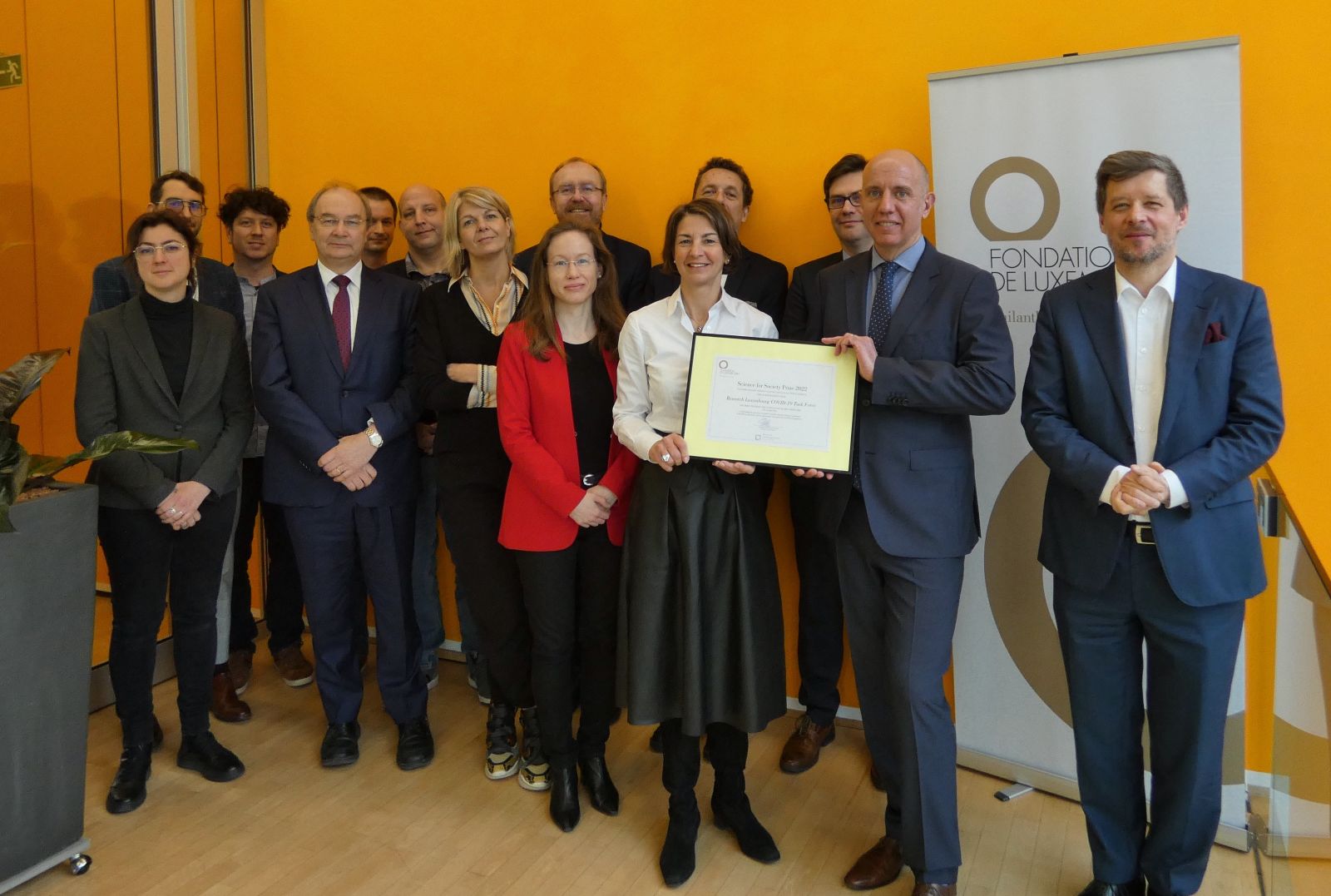The 2022 Science for Society Prize awarded to the Covid-19 Task Force in a ceremony - 28.03.2023
-
Themes
Health and Research -
Focus area
Research -
Region
Luxembourg -
Parent foundation
Science for Society Foundation
During a ceremony on March 28th, 2023 the second annual Science for Society Prize was awarded to the Research Luxembourg COVID-19 Task Force, represented by Prof. Paul Wilmes of the University of Luxembourg.

From left to right: Hélène Jacuszin, Research Luxembourg, Martin Fernandez Sanchez, LISER, Jean-Paul Bertemes, FNR, Prof. Dr Lucien Hoffmann, LIST, Prof. Jorge Gonçalves, LCSB - University of Luxembourg, Dr Alexander Skupin, LCSB - University of Luxembourg, Aline Muller, LISER, Dr Jasmin Schulz, LIH, Romain Martin, MESR, Tonika Hirdman, Fondation de Luxembourg, Ulf Nehrbass, LIH, Dr Henry-Michel Cauchie, LIST, Prof. Paul Wilmes, LCSB - University of Luxembourg, and Marc Schiltz, FNR.
The prize, created in 2021 by the Science for Society Foundation, under the aegis of Fondation de Luxembourg, recognizes a set of actions or efforts that effectively communicate credible scientific information to the general public.
The COVID-19 Task Force, a collective effort between several Luxembourg research institutions regrouped under Research Luxembourg, was awarded the prize for its key role in coordinating the provision of support from the national research community to healthcare providers and the government while bringing evidence-based research findings to the public’s attention in educational and informative ways.
By providing data on a regular basis throughout the duration of the pandemic, the Task Force helped inform government decisions, such as launching a large-scale testing programme, and effectively contributed to protecting the most vulnerable whilst keeping society open for others. In addition, the Task Force’s outreach efforts in the form of press conferences and media interviews kept the public informed on the evolving science around the new virus and linked disease.
Accepting the prize on behalf of the Task Force, Prof. Wilmes emphasized that the group’s effectiveness was thanks in part to its ability to communicate with a single, united voice on behalf of multiple actors from the research sector. He expressed his gratitude to his research colleagues, and added that the collaborative nature of the Task Force gave rise to long-lasting partnerships between scientists who would have been otherwise unlikely to work together.
The ceremony was attended by a number of representatives from the Task Force who shared their observations on the evolution of scientific communication throughout the pandemic and other important lessons learned from this time. Recalling the urgency at the onset of the pandemic, Ulf Nehrbass, CEO of LIH, explained the challenge in simplifying complex data for wider comprehension, and sharing that data with the general public at a faster pace than they were used to. The objectivity of their scientific findings, he added, ensured their communication was apolitical, even while Covid-19 became the focus of widespread, online misinformation campaigns.
In this respect, FNR Director Marc Schiltz underlined the importance of effective science communication, especially in times of crisis. “During the pandemic, there was a high demand from the general public to figure out what science knows and does not know about the virus and vaccines, and there was also a lot of fake information circulating.” Aline Muller, CEO of LISER, agreed, but acknowledged that it was natural for a disputed topic such as Covid-19 to generate differing viewpoints from the public. She reiterated data’s political neutrality, saying, “The role of science, in this respect, is to offer society an objective voice, based on fact, and to contribute to the overall knowledge base around the virus.”
Dr Henry-Michel Cauchie, Head of Environmental Microbiology and Biotechnology at LIST, echoed this idea, praising the role of local journalists, who proved to be key partners in relaying accurate information to the public. Hélène Jacuszin, Marketing and Communication Coordinator from Research Luxembourg added that the pandemic offered the research sector an exercise in transparency and a unique opportunity to show the public how science works behind the scenes.
Luxembourg’s response to the pandemic was later praised by the OECD, which credited the country for creating the Task Force at the onset of the crisis. For Romain Martin, Premier Conseiller du Gouvernement, MESR, this success would not have been possible without the public’s cooperation. For example, the high participation rates in the large-scale testing programme, implemented based on the recommendations of the Task Force, offered an opportunity to educate and work with members of society, and at the same time to understand the evolution of the virus and adjust policies accordingly.
While the urgency of the pandemic has subsided, a need remains for effective communication of credible scientific information to the general public. To this end, the Science for Society Prize will be renewed for a third edition in 2023.
As a reminder, the prize rewards a project, action or a set of activities that have enabled the public to reveal, explain and put scientific evidence into context in public debate, understand develop critical thinking based on scientific facts, or debunk fake news thanks to a scientific demonstration or communication. The award amounts to 5.000 EUR and is allocated based on the review of an independent jury. The call for applications for the 2023 Science for Society Prize will be launched in Autumn 2023.
Information
- Start date : 28.03.2023 10:00
- End date : 01.07.2023 10:29
